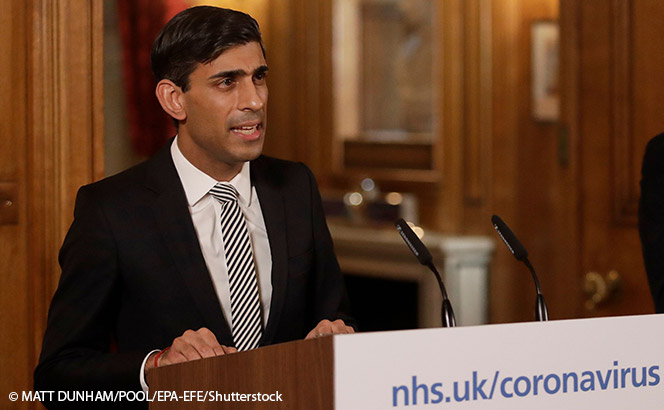Law firm leaders have responded positively to the UK chancellor of the exchequer Rishi Sunak’s ‘unprecedented’ level of state protection in response to the coronavirus but warn it will need to be the tip of the iceberg. With the pandemic showing no sign of being contained, the economic impact is predicted to be much deeper than in the last financial crisis.
The package to support businesses and employees announced on Friday (20 March) followed on from a £30bn rescue operation in the budget earlier this month and includes drastic measures to prevent companies going into liquidation as the impact of Covid-19 continues to send global economies into a tailspin.
Measures include a coronavirus job retention scheme to offer all employers access to a grant covering up to 80% of the average wage, worth up to £2,500 a month, to prevent mass redundancies in the coming weeks and months.
A deferral system means that businesses will not pay VAT for a quarter until the end of June, with companies not liable for VAT deferred during that period until the end of the 2020/21 financial year. The government has instated a coronavirus business interruption loan scheme that will allow companies to apply for loans interest free for 12 months in light of economists’ predictions that the financial crisis will be far wider-reaching than any since World War II.
While law firm leaders and practice heads have taken some solace in what has been an undeniable show of support for UK businesses, many believe the fast-evolving nature of the crisis will mean that the measures may not be enough for long.
Says Andrew Edge, Stephenson Harwood’s head of corporate: ‘The economic shock will be huge. The money has stopped flowing around the system, the government had to do something, and it has made a statement of intent that it will provide support. Some level of state support is required at the moment as these are unprecedented times. It will dwarf the previous financial crash. It will be much deeper, potentially shorter, but so deep it will cost a fortune to put right. The money flows are just going to come to a stop.’
Every leader is aware of the age-old difficulty of getting bills settled during a global financial crisis. ‘If anyone says this isn’t going to impact the speed with which clients pay, they’re on another planet,’ says another corporate head at a City firm. ‘Our survival relies on our ability to get paid for the work we’ve done. We are a strong firm with a robust financial position. We want to help clients and hopefully they won’t abuse the supply chain.’
Indeed, the role of global law firms over the next few months looks set to be a mixture of proving relevance with reams of Covid-19-related advice on a pro-bono basis and getting existing debtors to pay up outstanding cash before companies really have their backs against the wall. And that in addition to the immediately pressing issues around ensuring staff can work from home as seamlessly as possible for the foreseeable future.
John Joyce, managing partner of Addleshaw Goddard, says: ‘There’s a balance, we’ve got clients who have stuck with us and us them for a long time. Undoubtedly, everyone will have the same squeeze on cash. Even with our reserves [£80m], we’ve got to keep cash flowing through the business.’
The job retention measures, VAT deferrals and tax breaks in particular have been universally received as welcome relief but everyone agrees this will have to be the first of many support packages if the economy is to avoid a battering as the crisis evolves. ‘There is no Coronavirus crisis playbook you can just pull off the shelf. No-one’s saying here’s a set of definitive measures and that’s it. People are taking incremental steps as the circumstances develop,’ says Ashurst’s corporate head Jason Radford.
There are some hopeful noises around fee-generating work advising governments on force majeure provisions, private sector clients wanting to reduce exposure to suppliers and clients wanting immediate access to liquidity or needing to understand where they stand with respect to existing financing arrangements. But these can take time to translate to proper advisory mandates.
There seems no doubt that deal-related fees are inevitably going to take a substantial hit. Says Joyce: ‘We track hours and that has dropped off a little bit but held up massively compared to what we would have expected. Whether that’s the case in a few months, who knows. We’ve got deals nearing their end that may or may not happen, and we just don’t know what will happen in terms of new deals yet. For instance litigation is flying, but once they start closing the courts it’s impossible to say.’
While the full impact of the crisis will not be known for several months or even years, the one certainty is that this latest government commitment cannot be the last. Concludes David Collins, Dentons UK’s head of corporate: ‘Once we are over the worst of the pandemic, there will need to be further actions from governments to stimulate growth and demand in the market.’
nathalie.tidman@legalease.co.uk











